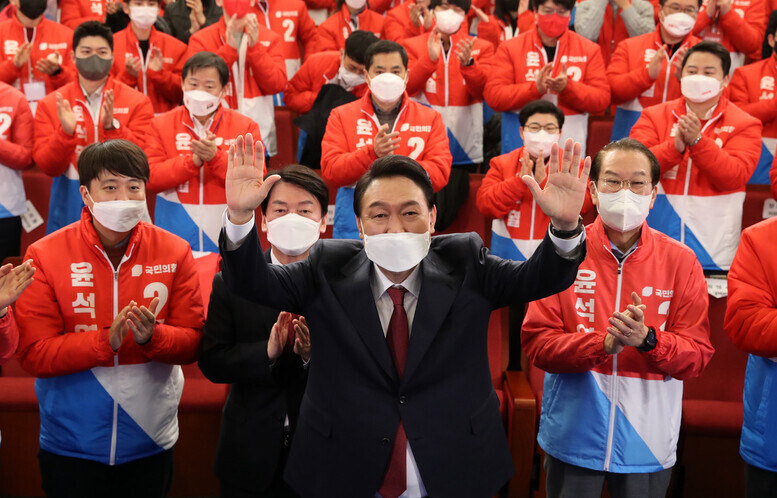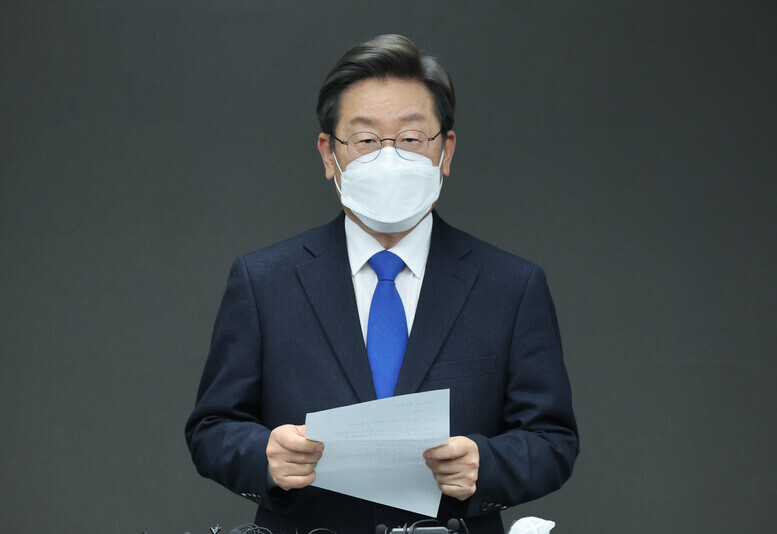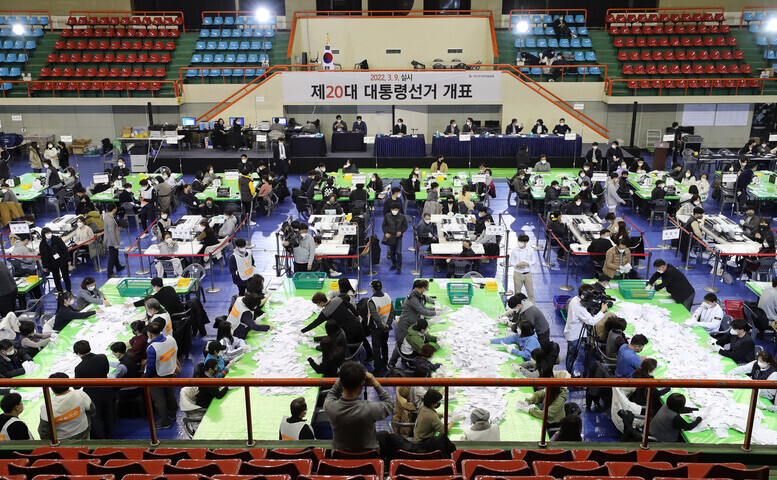hankyoreh
Links to other country sites 다른 나라 사이트 링크
[Editorial] Our message to president-elect Yoon: National unity must come first

People Power Party presidential candidate Yoon Suk-yeol has been elected president. After a breathtakingly close match with Democratic Party candidate Lee Jae-myung, Yoon was declared the winner in the race to the Blue House during the early hours of Thursday.
According to the ballot count, Yoon won 48.6% of the vote, a figure 0.8 percentage points higher than Lee’s (47.8%). That’s a difference of roughly 260,000 votes, the slimmest margin since the direct presidential election system was revived in 1987.
Yoon: “I will serve the people by [. . .] cooperating with the opposition”With Yoon’s victory, an era of conservative government is set to begin after five years of Democratic Party rule. After his victory was confirmed, Yoon came out to the ballot count situation room set up at the National Assembly Library and stated, “I learned a lot during the election campaign. I learned many things, such as what’s needed to become a leader of a nation, and how to listen closely to the voices of the citizenry.”
“I will serve the people by respecting the spirit of the constitution, respecting the National Assembly, and cooperating with the opposition,” Yoon said, adding, “I also thank both candidate Lee Jae-myung and candidate Sim Sang-jung, and I want to express my high regard for the valuable fact that we all significantly contributed to the development of South Korean politics.”
Yoon’s victory was backed by a strong popular consensus to put a new political party in power. Conservatives’ fierce desire to take back the Blue House enabled a political novice who stepped down from his role as prosecutor general only a year ago and plunged into the world of politics to rise to the presidency. Also at the backdrop of Yoon’s triumph were the Moon Jae-in administration’s failed real estate policies and the perceived hypocrisy of high-ranking public officials, which led to growing disappointment and rage among the populace. Though Lee Jae-myung sought to counter this reality by promising a “change of politics,” he was unable to overcome the consensus for a “change of the ruling party.”
Yoon must reflect on why majority of voters did not choose himNevertheless, it should be noted that Yoon won against Lee by a hair’s breadth despite the popularity of flipping the Blue House, not to mention that he failed to win by a majority despite merging his campaign with that of People’s Party candidate Ahn Cheol-soo. The people chose president-elect Yoon as “the symbol of a new ruling party,” but it seems that they might not yet have full confidence in his readiness to lead government administration.
In fact, throughout the campaign period, Yoon’s strategy relied on staunch conservatives’ loathing towards the Moon administration instead of making a case for himself by offering solid campaign promises and visions for the future. In particular, Yoon must take to heart that his “politics of division,” through which he attempted to shore up support by sowing conflict between men and women in their 20s and 30s, betrayed him by prompting mass resistance among women in the run-up to the election.
President-elect Yoon must reflect on why a majority of voters cast their ballot to candidates other than him in what was in essence a two-way race. Though conflict among political camps has been a staple in our winner-takes-all presidential system, hostilities ran especially deep during this year’s election. It’s an undeniable fact that this year’s race for the presidency was dominated by hatred and a cutthroat mentality that gave rise to single-minded antagonisms against opposing candidates, rather than by an emphasis on the qualities and competence demonstrated by each candidate. If such extreme division and conflict continue even after the election, they will be sources of national misfortune.
As the winner of the election, Yoon inevitably has the lion’s share of responsibility for resolving these issues and guiding the country towards unity. Yoon should consider deeply how to heal the deep wounds the election process left behind in the hearts of the citizenry and strive to launch an “administration of national unity” worthy of such a name as he promised.

Disavow political retaliation with actions
Given his past as the nation’s top prosecutor, many citizens are worried that the Yoon administration will turn South Korea into a “prosecutors’ republic.” Yoon should unequivocally ease such concerns.
Moreover, he should publicly disavow political retaliation and act accordingly, thereby relieving the anxiety of half the citizenry who support President Moon and Lee Jae-myung. This will be Yoon’s first step in demonstrating a leadership based on unity and cooperative governance.
Yoon previously expressed his intention to investigate the Moon administration by way of his close aides such as Chief Prosecutor Han Dong-hoon. If Yoon expects to seize political power via a planned investigation early in his tenure despite an opposition majority in the National Assembly, there’s no doubt that conflict and confrontation will rage even more than they are currently. The moment Yoon takes aim at his predecessor, who has kept his approval rating up even at the tail end of his term, public sentiment will divide into two, which will cause Yoon to waste the most important period of his presidency — its early days — dealing with extreme conflict.
Yoon should live by his campaign slogan, which stated that he was a candidate “raised by the citizenry,” and walk the path of unity with citizens at the helm from beginning to end.
Cooperative governance is a mustConsidering that the Democratic Party holds the majority of seats in the National Assembly, unity and cooperative governance are not an option for Yoon — they are requirements. There’s no other way for him to lead state affairs smoothly and stably.
Yoon himself promised to form a coalition government while merging his campaign with that of Ahn Cheol-soo at the last minute of the election campaign. Beyond his minor coalition with the People’s Party, Yoon should proclaim and act by a principle of overarching unity that spans all political factions.
Another alternative will be to recruit a wide array of competent and ethical talent regardless of political leaning into his administration. Furthermore, Yoon should strive to establish systemic frameworks for political unity, such as by reforming the electoral system to open up the possibility of a multiparty coalition government, and by amending the constitution to further redistribute the authority centered in the president.
Likewise, the Democratic Party should faithfully fulfill its responsibility of critique and power checks without abusing its majority in the National Assembly by becoming a force of “opposition for the sake of opposition.” Lee Jae-myung congratulated Yoon on his victory in a press conference at the Democratic Party headquarters in Yeouido, adding, “I sincerely ask the president-elect to prevail over conflict and division and bring forth an age of unity and harmony.”
Both the ruling party and the opposition must fear the citizenry and collaborate with each other to demonstrate cooperative governance.
Yoon promised to leave the Blue House and launch a presidential office in Gwanghwamun, saying, “If there are no safety concerns, I want to be able to hear the citizenry protest and make their complaints while sitting in my office, even if that causes disturbances in my work.” He also promised to meet with reporters every week with no strings attached. Hopefully, he will also keep his promise with the people of Korea to communicate and engage in dialogue.

The first task Yoon will have to resolve as president would be to overcome the COVID-19 crisis and revitalize the livelihood of the public. Until now, he could criticize the administration and leave it at that, but from now on, he must closely examine and care for the lives of citizens as the head of state affairs. In particular, Yoon should polish and quickly implement his campaign promise to recoup the losses suffered by small businesses. He will also have to devise fundamental ways to stabilize the housing market and improve the job market rather than simply treating the symptoms of these issues.
Yoon should also urgently respond to the rapidly deteriorating economy. Already saddled by the spread of Omicron, disruptions in the global supply chain, and inflation, the South Korean economy is facing unprecedented uncertainties following Russia’s invasion of Ukraine. International oil prices have shot up to US$130 a barrel, prompting concerns of a third oil shock.
Though Yoon made quite a number of campaign pledges regarding the economy leading up to the election, it won’t be easy to put those promises into practice right away under the current economic circumstance. Yoon needs to respond to these challenges by recalibrating the importance and priority of his promises during the soon-to-launch Presidential Transition Committee.
Transitional challenges of our age as represented by the climate crisis should also be brought to attention. In the fields of diplomacy and security, on which national safety and the lives of the citizenry depend, a practical approach that prioritizes national interest must be sought rather than a formulaic ideological approach. Yoon should also be extra cautious when dealing with campaign pledges that inspire drastically conflicting responses from citizens, such as the scrapping of the nuclear phase-out policy and the abolition of the Ministry of Gender Equality and Family.
President-elect Yoon will be in charge of the Republic of Korea for five years starting May 9. Under a presidential system, the fate of the nation and its citizenry is primarily decided by the success or failure of the president. We hope that Yoon will take to heart the aspirations of all citizens regardless of their support for him and guide the Republic of Korea through a safe voyage.
Please direct questions or comments to [english@hani.co.kr]

Editorial・opinion
![[Column] Season 2 of special prosecutor probe may be coming to Korea soon [Column] Season 2 of special prosecutor probe may be coming to Korea soon](https://flexible.img.hani.co.kr/flexible/normal/500/300/imgdb/original/2024/0426/3317141030699447.jpg) [Column] Season 2 of special prosecutor probe may be coming to Korea soon
[Column] Season 2 of special prosecutor probe may be coming to Korea soon![[Column] Park Geun-hye déjà vu in Yoon Suk-yeol [Column] Park Geun-hye déjà vu in Yoon Suk-yeol](https://flexible.img.hani.co.kr/flexible/normal/500/300/imgdb/original/2024/0424/651713945113788.jpg) [Column] Park Geun-hye déjà vu in Yoon Suk-yeol
[Column] Park Geun-hye déjà vu in Yoon Suk-yeol- [Editorial] New weight of N. Korea’s nuclear threats makes dialogue all the more urgent
- [Guest essay] The real reason Korea’s new right wants to dub Rhee a founding father
- [Column] ‘Choson’: Is it time we start referring to N. Korea in its own terms?
- [Editorial] Japan’s rewriting of history with Korea has gone too far
- [Column] The president’s questionable capacity for dialogue
- [Column] Are chaebol firms just pizza pies for families to divvy up as they please?
- [Column] Has Korea, too, crossed the Rubicon on China?
- [Correspondent’s column] In Japan’s alliance with US, echoes of its past alliances with UK
Most viewed articles
- 1Is Japan about to snatch control of Line messenger from Korea’s Naver?
- 2‘We must say no’: Seoul defense chief on Korean, USFK involvement in hypothetical Taiwan crisis
- 3[Editorial] Korea’s surprise Q1 growth requires objective assessment, not blind fanfare
- 4Division commander ordered troops to enter raging flood waters before Marine died, survivor says
- 5The dream K-drama boyfriend stealing hearts and screens in Japan
- 6S. Korea “monitoring developments” after report of secret Chinese police station in Seoul
- 7[Column] Season 2 of special prosecutor probe may be coming to Korea soon
- 8No good, very bad game for Korea puts it out of Olympics for first time since 1988
- 9[Column] ‘Choson’: Is it time we start referring to N. Korea in its own terms?
- 10Is N. Korea threatening to test nukes in response to possible new US-led sanctions body?